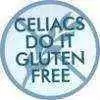-
Welcome to Celiac.com!
You have found your celiac tribe! Join us and ask questions in our forum, share your story, and connect with others.
-
Celiac.com Sponsor (A1):
Celiac.com Sponsor (A1-M):
-
Get Celiac.com Updates:Support Our Content
Eating Disorders & Celiac Disease
-
Get Celiac.com Updates:Support Celiac.com:
-
Celiac.com Sponsor (A17):
Celiac.com Sponsor (A17):
Celiac.com Sponsors (A17-M):
-
Recent Activity
-
- knitty kitty commented on Scott Adams's article in Multiple Sclerosis and Celiac Disease3
Gluten-Free Diet Linked to Reduced Inflammation and Improved Outcomes in Multiple Sclerosis (+Video)
I worried at one point on my journey whether I had MS, having many of the symptoms myself. However, my symptoms improved dramatically with high dose thiamine hydrochloride, Benfotiamine, and Thiamine TTFD. Thiamine deficiency symptoms overlap with MS symptoms, including changes on brain MRIs. Thiamine deficiency affected my eyes (light sensitivity),...- autoimmune disease
- celiac disease
- (and 7 more)
-
- trents replied to Matthias's topic in Coping with Celiac Disease1
Unexpected gluten exposure risk from cultivated mushrooms
Welcome to the celiac.com communiuty, @Matthias! Yes, we have been aware that this can be an issue with mushrooms but as long as they are rinsed thoroughly it should not be a problem since the mushrooms don't actually incorporate the gluten into their cellular structure. For the same reason, one needs to be careful when buying aged cheeses and products... -
- Matthias posted a topic in Coping with Celiac Disease1
Unexpected gluten exposure risk from cultivated mushrooms
The one kind of food I had been buying and eating without any worry for hidden gluten were unprocessed veggies. Well, yesterday I discovered yet another pitfall: cultivated mushrooms. I tried some new ones, Shimeji to be precise (used in many asian soup and rice dishes). Later, at home, I was taking a closer look at the product: the mushrooms were growing... -
- trents replied to catnapt's topic in Celiac Disease Pre-Diagnosis, Testing & Symptoms9
how much gluten do I need to eat before blood tests?
I might suggest you consider buckwheat groats. https://www.amazon.com/Anthonys-Organic-Hulled-Buckwheat-Groats/dp/B0D15QDVW7/ref=sr_1_4_pp?crid=GOFG11A8ZUMU&dib=eyJ2IjoiMSJ9.bk-hCrXgLpHqKS8QJnfKJLKbKzm2BS9tIFv3P9HjJ5swL1-02C3V819UZ845_kAwnxTUM8Qa69hKl0DfHAucO827k_rh7ZclIOPtAA9KjvEEYtaeUV06FJQyCoi5dwcfXRt8dx3cJ6ctEn2VIPaaFd0nOye2TkASgSRtdtKgvXEEXknFVYURBjXen... -
- Scott Adams replied to SilkieFairy's topic in Celiac Disease Pre-Diagnosis, Testing & Symptoms2
IBS-D vs Celiac
What you’re describing really does not read like typical IBS-D. The dramatic, rapid normalization of stool frequency and form after removing wheat, along with improved tolerance of legumes and plant foods, is a classic pattern seen in gluten-driven disease rather than functional IBS. IBS usually worsens with fiber and beans, not improves. The fact that y...
-






Recommended Posts
Archived
This topic is now archived and is closed to further replies.